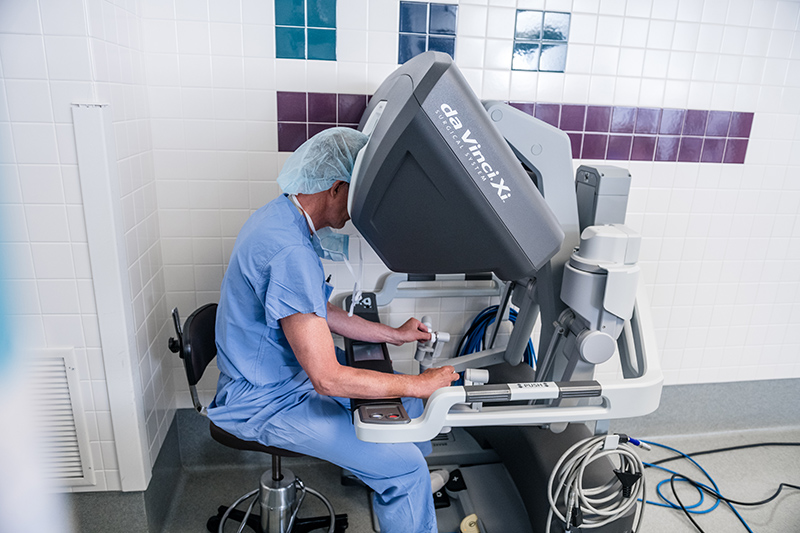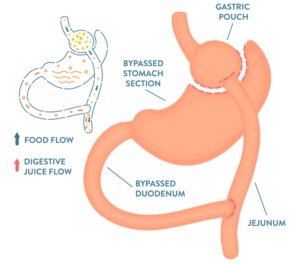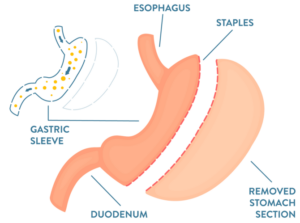Bariatric Surgery
For those who qualify for bariatric surgery, weight loss is not just about the numbers on the scale or the size of their jeans. Significant weight loss can help reduce the risk of further health conditions or help them manage ones they already have. For that, we offer minimally invasive sleeve gastrectomy and gastric bypass surgeries.
Surgery Overview
Our metabolic and bariatric surgery team is dedicated to making a customized plan and coordinating the care of weight loss experts. You will safely and successfully lose pounds and maintain a healthy weight.
- Our surgeons are specially trained in minimally invasive techniques (robotic and laparoscopic), which decrease pain and lead to shorter recovery times.
- We are an accredited facility by the American College of Surgeons and the American Society for Metabolic and Bariatric Surgery.
- We offer a full suite of services for weight-loss success, including behavioral health, fitness classes, nutrition, support groups, and outpatient and home visit follow-up from our community paramedic services.

Surgical Options
Click on a surgery name to learn more and find out where it's offered.
Roux-en-Y Gastric bypass is a surgical procedure that makes the stomach smaller and causes food to bypass some of the small intestine. The smaller stomach reduces the amount of food you can eat (restrictive) and the intestinal bypass reduces the amount of food and nutrients your body absorbs from meals (malabsorption). An average stomach is able to hold about 40 ounces of food. After this procedure, your new stomach “pouch” will only be able to handle about 2 ounces of food at a time.

Advantages
- Quicker weight loss
- Better long-term weight loss
- Slightly better resolution of diabetes and hypertension
Disadvantages
- Slightly higher surgical risk
- More challenges with absorbing certain nutrients, especially iron, calcium, and vitamins. These concerns are usually easy to correct with extra daily multivitamins.
- Possible dumping syndrome. Dumping syndrome helps discourage “sweets” (high sugar foods) intake.
- Possible anemia
Offered at: North – Robbinsdale Hospital
This is a new restrictive procedure. In this surgical procedure, about 4/5 of the stomach is removed, leaving a narrow tube or “sleeve.” The intestines are not rearranged or bypassed as they are in the Roux-en-Y gastric bypass surgery.
This procedure greatly reduces the size of the stomach and amount of food you can eat. After this procedure, the stomach will be about the size of a banana (about 2.5-3.0 ounces).
Sleeve gastrectomy also typically results in decreased hunger sensations due to hormonal changes from removal of the lateral stomach. Food will still be absorbed normally in the intestines. Some behaviors will need to be modified in order to achieve and maintain weight loss. This includes how much and what you eat.

Advantages
- Lower surgical risk
- Less difficulty absorbing nutrients
- Lower risk of dumping syndrome
- Lower risk of anemia
- Ability to change to a gastric bypass if needed
Disadvantages
- Less average weight loss than gastric bypass. Average is 50-60% of extra weight.
- This surgery is irreversible.
Offered at: North – Robbinsdale Hospital
How Does it Work?
There are three different ways bariatric surgery works:
Restrictive procedures decrease the amount of food the person can eat.
Malabsorptive procedures change the digestion so that the body only absorbs part of the food. The result is that more of the food leaves the body in the stool.
Neurochemical disruption – Both the Sleeve Gastrectomy and the Roux-en-Y Gastric Bypass operations change the way your body reacts to food. This includes a change in the way your body responds to many different hormones and chemicals involved in digestion, metabolism, hunger, and satiety.
Bariatric Surgeries Performed at North Memorial Health
North Memorial Health offers two types of surgical procedures for weight loss – Roux-en-Y Gastric Bypass and Sleeve Gastrectomy. You and your surgical team will discuss the different options and which procedure may be best for you.
The Roux-en-Y Gastric Bypass is considered the “gold standard” of weight loss surgery and has been around for a long time. It has both restrictive and malabsorptive properties.
The Sleeve Gastrectomy has recently become the most popular weight loss surgery being performed. It is considered a restrictive procedure. After sleeve gastrectomy, there are typically lower levels of the hormone Ghrelin which may make you feel less hungry.
Frequently Asked Questions
Laboratory tests and imaging studies will depend on the patient. All patients need some blood tests. Some may need more tests. For example, people who take blood thinners may need additional lab testing. All women of child-bearing age will have a pregnancy test. Some people may have imaging tests such a gallbladder ultrasound, EGD (upper endoscopy), and colonoscopy. People who snore a lot and are drowsy during the day may need a sleep study to check for sleep apnea.
Laparoscopic or robotic: Once you are able to take one ounce every 15 minutes for a few hours and up ambulating independently, you will be evaluated for discharge.
Each person’s recovery is different, and the length of stay may vary depending on his or her needs.
Risk of death from bariatric surgery is less than 1 percent, and lower than that of other common surgeries, such as hip replacement. It's about the same as gallbladder surgery. Successful bariatric surgery can reduce your long-term risk of death, including being 90 percent less likely to die from diabetes, about 60 percent less likely to die of cancer-related death, and 50 percent less likely to die of heart disease. Your life expectancy may actually increase by about 7 to 10 years.



